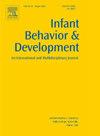幼儿对元音和谐前体的敏感性与语言经验无关
IF 2
3区 心理学
Q3 PSYCHOLOGY, DEVELOPMENTAL
引用次数: 0
摘要
知觉发展理论在最初的知觉敏感性和语言经验对婴儿言语知觉的影响程度上存在差异。现有的研究主要集中在婴儿区分母语和非母语语音类别的能力上。在两个实验中,我们调查了婴儿对相似声音之间关系的发展感知,即元音和谐模式,为这场辩论提供信息。在实验1中,我们发现语言经验对元音和声的检测是不必要的;没有和谐经验的4个月婴儿可以区分和谐和不和谐的nonce词。我们认为这是由于一种普遍的感知分组偏见,其中相似的声音被认为是分组在一起,尽管他们的时间距离。在实验2中,我们发现在没有相关语言经验的情况下,当婴儿开始适应母语的声音模式时,这种对元音和谐的初始敏感性在8个月时下降。我们认为,我们的结果,结合以往的发现,是最好的解释知觉调谐理论。如果没有语言输入的强化,婴儿对元音和谐的敏感度会下降;但对相似元音之间关系的初步敏感可能有助于婴儿学习母语中的元音和谐模式。本文章由计算机程序翻译,如有差异,请以英文原文为准。
Young infants’ sensitivity to precursors of vowel harmony is independent of language experience
Theories of perceptual development differ in the extent to which initial perceptual sensitivities and language experience influence infants’ perception of speech. Extant research focuses largely on infants’ ability to distinguish native and non-native speech sound categories. In two experiments, we investigated infants’ developing perception of relationships between similar sounds, i.e., vowel harmony patterns, to inform this debate. In Experient 1, we showed that language experience is not necessary to detect vowel harmony; 4-month-olds without harmony experience can differentiate harmonic and disharmonic nonce words. We argue that this is due to a universal perceptual grouping bias, wherein similar sounds are perceived as being grouped together despite their temporal distance. Then in Experiment 2, we showed that without relevant language experience, this initial sensitivity to vowel harmony declines by 8-months as infants begin to tune into the sound patterns of their native language. We argue that our results, combined with previous findings, are best explained under perceptual attunement theories. When not reinforced by their language input, infants show a decline in their sensitivity to vowel harmony; but an initial sensitivity to relationships between similar vowels may facilitate infants’ learning of vowel harmony patterns in their native language.
求助全文
通过发布文献求助,成功后即可免费获取论文全文。
去求助
来源期刊

Infant Behavior & Development
PSYCHOLOGY, DEVELOPMENTAL-
CiteScore
4.10
自引率
4.80%
发文量
94
期刊介绍:
Infant Behavior & Development publishes empirical (fundamental and clinical), theoretical, methodological and review papers. Brief reports dealing with behavioral development during infancy (up to 3 years) will also be considered. Papers of an inter- and multidisciplinary nature, for example neuroscience, non-linear dynamics and modelling approaches, are particularly encouraged. Areas covered by the journal include cognitive development, emotional development, perception, perception-action coupling, motor development and socialisation.
 求助内容:
求助内容: 应助结果提醒方式:
应助结果提醒方式:


